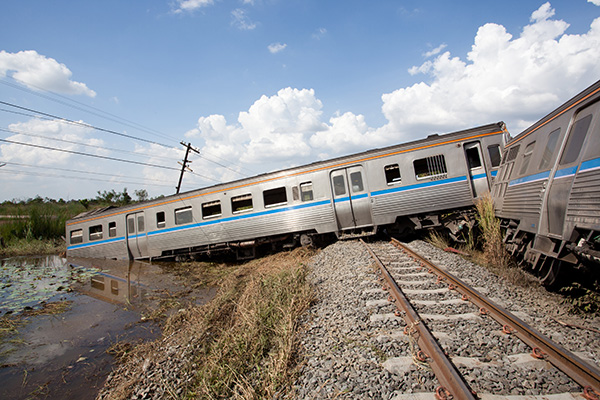Riverside Train Accident Lawyer

 There’s something about a train. Cute, colorful toy trains are a perennial favorite in the toy boxes of young children. Collectors and hobbyists build elaborate model train layouts to indulge their fascination. Historians ponder the role of railroads in shaping communities, economies, technologies and travel. Industries rely on trains to transport goods, and commuters turn to trains for a safe way to get from point A to point B. Unfortunately, trains aren’t immune to safety issues, and when things go wrong, the results are often devastating. If you or someone you love has been injured or killed in a train accident in or around the Riverside, California, area, reaching out to an experienced train accident attorney is essential if you hope to receive the compensation that you deserve.
There’s something about a train. Cute, colorful toy trains are a perennial favorite in the toy boxes of young children. Collectors and hobbyists build elaborate model train layouts to indulge their fascination. Historians ponder the role of railroads in shaping communities, economies, technologies and travel. Industries rely on trains to transport goods, and commuters turn to trains for a safe way to get from point A to point B. Unfortunately, trains aren’t immune to safety issues, and when things go wrong, the results are often devastating. If you or someone you love has been injured or killed in a train accident in or around the Riverside, California, area, reaching out to an experienced train accident attorney is essential if you hope to receive the compensation that you deserve.
What Qualifies as a Train Accident?
A train accident is defined as a crash or disaster involving one or more trains. However, trains aren’t the only participant in these types of crashes. There are many kinds of train accidents:
- Train versus train collisions.
- Vehicle versus train collisions.
- Pedestrian versus train accidents.
- Single train crashes.
- Railroad crossing accidents.
- Platform or station accidents.
- Derailments.
Train Accident Statistics
Statistics offer sobering insight into train accidents:
- Each year, roughly 1000 people die in train accidents; thousands more are injured.
- A train collision or derailment occurs roughly every 90 minutes.
- On average, one train carrying hazardous materials through the U.S. derails every two weeks.
- More than 50% of railroad accidents occur at unprotected crossings; more than 80% of crossings lack adequate warning devices.
- Passengers in vehicles involved in train accidents are 40 times more likely to die than if the crash involved two vehicles of comparable size.
- Rail companies rely heavily on technology developed more than 70 years ago. Safety updates and improvements are often slow or absent.
- Local jurisdictions have little control over the movement of trains through their area.
What Causes Are Often Cited in Train Accidents?
When a train accident occurs, what is to blame? Just as there are several types of train accidents, there are many factors that can contribute to a train accident:
- Human error. Things like inexperience, distraction and fatigue can lead to mistakes on the parts of train operators. They can also lead pedestrians and operators of other vehicles to blunder into a train’s path.
- Recklessness. Few drivers enjoy waiting for a long train to pass, but patience can save lives. Reckless behavior like trying to beat a train is a common cause of train accidents.
- Mechanical failures. Trains are complex machines, and like any machine, they can break down. Mechanical failures with the trains, the switches that control the tracks that they run on or the signals designed to enhance safety can be factors in an accident.
- Defective or obstructed tracks. Damaged rails and foreign objects left on the track like a landslide or a stalled car can trigger a derailment.
- Speed. Countless studies show that the faster a train is traveling, the more severe the consequences of a crash are.
- Weather. Weather can limit invisibility and impair control systems, making operating a train or driving a vehicle near a train more dangerous.
- Unprotected railroad crossings. Lack of safety or warning equipment, poor visibility, distraction, recklessness, and a conductor’s failure to sound an alarm are often cited in accidents at unprotected crossings.
- Suicides. When individuals attempt suicide by train, they endanger not only themselves but also the people on the train.
- Negligence. When crucial maintenance is not performed, updates to safety systems are not completed, a railroad employee fails to do a vital task, or a mechanical failure is caused by shoddy workmanship, negligence is likely a factor.
Who Are the Victims of Train Accidents?
A train accident can do a lot of harm to a variety of people. Railroad workers and passengers on the train may be hurt in a crash. Bystanders may negatively impacted by a toxic chemical spill after a train carrying hazardous materials derails. Alternately, they may be passengers in a car involved in a collision with a train or hit by cargo that flies off the train. Pedestrians may be maimed or killed if they are on or near the tracks when a train goes by. In some cases, this involves travelers waiting on the platform who slip off. Others involve children playing along unfenced rails.
Train Accident Injuries
With a train’s massive size and weight, injuries resulting from a train accident are often catastrophic. Victims often experience amputations, traumatic brain injuries, spinal injuries, broken bones and significant internal injuries. Many die as a result of their injuries. Those who survive are often left dealing with life-changing injuries.
Filing a Lawsuit and Liability
If you or a loved one has been harmed as a result of a train accident, a lawsuit may help you get the compensation that you deserve. Who would be defendant in this suit? That depends. Because trains are considered common carriers in the eyes of the law, railroad companies have a legal responsibility to keep their passengers safe. Therefore, if the railroad company is negligent, they may be held liable for the accident. However, the railroad company is not automatically at fault. If other parties caused or contributed to the accident, they may be held liable. As a result, pedestrians, vehicle operators, equipment manufacturers and entities responsible for maintenance are all potential targets of a lawsuit.
Why Should You Hire a Train Accident Lawyer?
Why should you hire an experienced Riverside train accident attorney? Train accidents are complicated. There are often multiple parties involved, and the laws and statutes of limitations are different from the ones that govern other kinds of vehicle accident lawsuits. Having someone who knows what to expect and is ready to help you navigate the process effectively is priceless. The train companies and their insurers have lawyers, and they aren’t focused on your well-being. They’re paid to protect the company’s bottom line, so they’re trying to keep any settlement as small as possible. Having an attorney who will fight on your behalf is the best way to ensure that you receive fair compensation.
Are you searching for an effective train accident lawyer? Contact Rizio Lipinsky Heiting today to request a free consultation at our Riverside office.
Rizio Lipinsky Heiting - Riverside

Rizio Lipinsky Heiting - Riverside




















